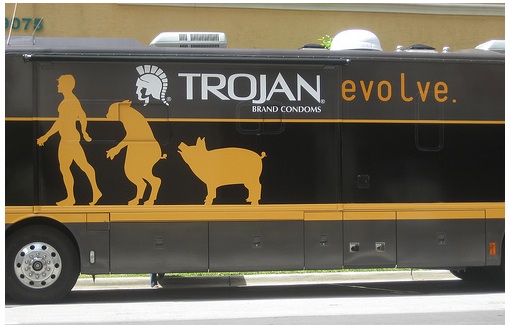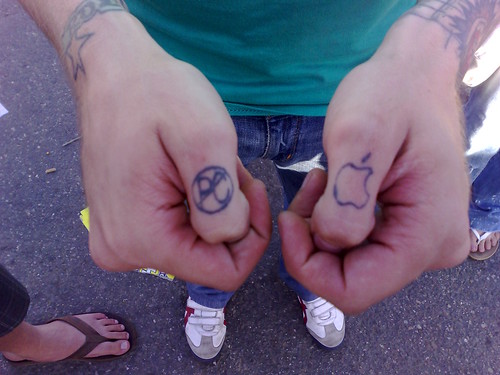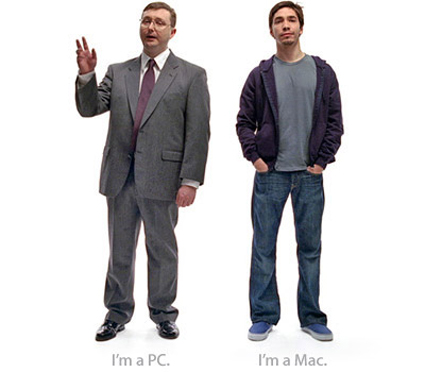
I know the Trojan “Evolve” Campaign has been going on for a while now, but just recently something occurred to me that I hadn’t quite realized about it before.
The campaign started out last June, with the premiere of a commercial featuring women being hit on by a bar full of anthropomorphized pigs. It’s only when one of the pigs finally shuffles off to the men’s room, and purchases a condom, that he is transformed into a hot guy, and returns to the girl he was chatting up to find that she’s now suddenly totally interested in him.
In addition to the ad, whose message at the end reads: “Evolve. Use a condom every time,” the campaign also includes a website, evolveoneevolveall.com, driven by celebrity and user-generated videos dealing with the subject of sexual health, the Trojan Evolve National Tour, a mobile, experiential campaign “Raising awareness and stimulating dialogue about America’s sexual health in towns and campuses across the country,” radio ads that deal with STDs as Christmas gifts (“How about Herpes? It’s the gift that keeps on giving.” / “Would you like Chlamydia wrapped?” / “No, I’ll give it to her unwrapped.”) and more. All of this, hinging on the word “Evolve.”
“Evolve is a wake-up call to change attitudes about using condoms and, on a larger scale, the way we think and talk about sexual health in this country,” said Jim Daniels, Trojan’s VP of marketing. As Andrew Adam Newman pointed out in the New York Times piece, “Pigs With Cellphones, but No Condoms,” the campaign is an evolution for Trojan itself:
While Mr. Daniels does not disparage the company’s double-entendre-heavy “Trojan Man” campaign from the 1990s or similar Trojan Tales Web site today, the tone of the company’s promotions is moving away from “Beavis and Butthead” and toward “Sex and the City.”
“The ‘Evolve’ ad does a nice job of being humorous, but it’s also a serious call to action,” Mr. Daniels said. “The pigs are a symbol of irresponsible sexual behavior, and are juxtaposed with the condom as a responsible symbol of respect for oneself and one’s partner.”
Newman suggest that “The perennial challenge for Trojan and its competitors is the perception that [condoms] are unpleasant to use.” But I think, for a company that, according to A. C. Nielsen Research, has 75 percent of the condom market (Durex is second with 15 percent, LifeStyles third with 9 percent), Trojan oughtta have really known better than that.
“Over the last few years conservative groups in President Bush’s support base have declared war on condoms,” wrote Nicholas D. Kristof, in an opinion piece, also in the New York Times:
I first noticed this campaign last year, when I began to get e-mails from evangelical Christians insisting that condoms have pores about 10 microns in diameter, while the AIDS virus measures only about 0.1 micron. This is junk science (electron microscopes haven’t found these pores), but the disinformation campaign turns out to be a far-reaching effort to discredit condoms, squelch any mention of them in schools and discourage their use abroad.
Then there are the radio spots in Texas: ”Condoms will not protect people from many sexually transmitted diseases.”
A report by Human Rights Watch quotes a Texas school official as saying: ”We don’t discuss condom use, except to say that condoms don’t work.”
Last month at an international conference in Bangkok, U.S. officials demanded the deletion of a recommendation for ”consistent condom use” to fight AIDS and sexual diseases. So what does this administration stand for? Inconsistent condom use?
Kristof was posing this question back in 2003, while he could still add, “So far President Bush has not fully signed on to the campaign against condoms, but there are alarming signs that he is clambering on board.”
In the now almost six years since, the very subject of contraception has become as politicized as abortion, and the emphasis on condoms’ ineffectiveness has become a standard component of Abstinence-Only sex education. (You knew about that, right?) It’s even begun to affect mass media. In a written response to Trojan about why they would not air the pigs-with-cell-phones ad, Fox (which had aired prior Trojan ads) said “Contraceptive advertising must stress health-related uses rather than the prevention of pregnancy.” CBS refused to air it, too, and didn’t even offer further comment. Meanwhile, as paid advertising for condoms is being turned away, in the past few months I’ve seen at least two TV shows where characters made a point of mentioning that condoms don’t work: Fringe, and The Practice–a show about DOCTORS for cryin’ out loud! (Clearly, “First do no harm” must not apply to the practice of TV medicine.)
As a teenager of the 90’s, I’ve never known a world where AIDS didn’t exist, and where condoms were anything but an unequivocal necessity for “safe sex” (also a 90’s-ism that seems to no longer be in use, replaced instead by the millennial “sexual health crisis”). Sure, no one was going around preaching that condoms are 100% fail-proof, but in the decade when Magic Johnson and Greg Louganis both came out as HIV-positive, I can’t imagine any TV program deliberately broadcasting (or being allowed to get away with it), the kind of message that says, “Condoms don’t work. So why bother using them at all?”
As of 2006 the birth rate among 15 to 19 year-olds in the United States has risen for the first time since 1991 (that was the year of Johnson’s announcement). While teenage sex rates have risen since 2001, condom use has dropped since 2003. In other words, more teenagers are having more sex, and using less and less condoms in the process. But then, Jamie Lynn Spears or Bristol Palin could have told you that.
And so it is we find ourselves in a situation where Church & Dwight—the consumer products company that owns Trojan—is taking on what should have been the responsibility of the Department of Health and Human Services. Teenage or not, the U.S. apparently has the highest rates of unintended pregnancy (three million per year) and sexually transmitted infections (19 million per year) of any Western nation. (What the fuck?!)
“Right now in the U.S. only one in four sex acts involves using a condom,” Says Daniels. “Our goal is to dramatically increase use.” Then what in God’s name convinced the Kaplan Thaler Group, the New York advertising agency that created the “Evolve” campaign, that aligning condoms with evolution was the way to go about achieving this?
Cuz here’s the thing: The majority of Americans do not believe in evolution!

(CRAP!)
In fact, according to 2006 research in Science Magazine, out of 33 European countries where peolpe were asked to respond “true”, “false”, or “whuuuu?” to the statement: “Human beings, as we know them, developed from earlier species of animals,” the only country that scored lower on belief in evolution than the US is Turkey (Also what the fuck?!)
Disturbing as this unfortunate reality may be, this is the contemporary American Landscape, and pushing Trojan as “Helping America evolve, one condom at a time,” in the face of it, seems ludicrous.
Hell, why not just call the campaign “Darwin’s theory of contraception,” while you’re at it?
The biggest threat to condoms is not the perception that they don’t feel good. It’s not even condom fatigue. The biggest threat to condoms is the Christian Right’s propaganda that they don’t work, and the government’s, and much of media’s, wholehearted complicity. And it’s the same people who are waging a war on contraception that don’t like Evolution either. I don’t know about the ultimate impact that the Evolve campaign is effecting (or not), but in my view, if, as Daniels says, Trojan’s focus is on growing the market beyond the–pardon the irony here–already converted, and getting more people to use condoms, I think a completely different slogan/campaign theme would be the way to go.





